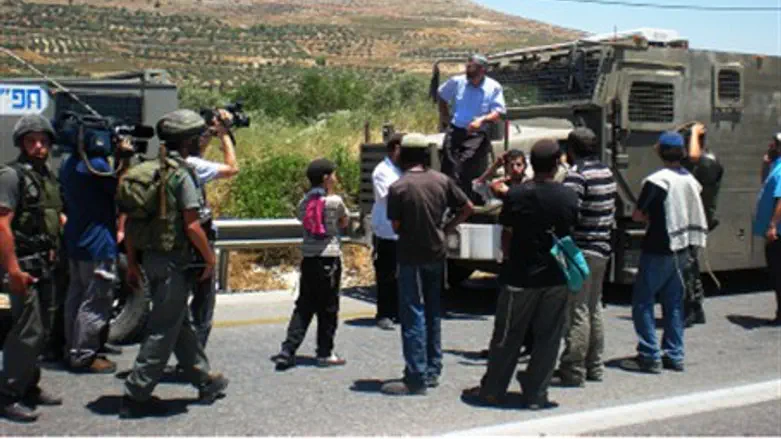
A nationalist media watchdog group has issued a call to rabbis to permit the hiring of professional cameramen to document attacks and provocations by Arabs and leftists that occur on the Jewish Sabbath.
Chanie Luz, director of Tadmit, has penned an article on the Srugim website in which she argued that the latest confrontation at Yitzhar showed that Israeli media cannot be relied upon to give an objective account of incidents such as these.
The incident ended with a Jew firing his weapon at an Arab, and it was this part of the event that was covered by the media, which used a video shot and edited by the pro-terrorist B'Tselem organization.
However, that bullet was only fired after dozens of incited Arabs hurled rocks at Jews who were hiking to the local spring, and set fields ablaze in the hope that the fire would consume Yitzhar. The media downplayed or ignored the Arab attack and played up the Jewish response to a life-threatening situation.
Luz writes that the incident reminded her of another terror attack in 2008, in which a terrorist stabbed a nine-year-old boy in Yitzhar on a Sabbath. Israeli media played up video showing the response by men from Yitzhar, who went on a rampage in the attacker's village, but covered up the terrorist attack that provoked it.
"The Arabs document these events, but the Jews hardly do so," contends Luz. "The latest event, too, occurred on Shabbat, and the result in the media is that B'Tselem gets the entire stage on Shabbat, while after Shabbat there is no Jewish video material that can be disseminated."
The edited materials are used to besmirch the IDF, the Jews of Judea and Samaria, and Jews in general, she notes. This libel creates anti-Semitism and places the IDF on the defensive as well. As a result, people lose their lives: the IDF is hamstrung, soldiers cannot effectively protect their own lives and those of Jewish residents against Arab attacks, and Jewish residents cannot defend themselves -- all because of legal limitations placed on them as a result of media disinformation that portrays them as the attackers.
While Luz does not say this outright, it is clear she is hinting that this places the matter in the field of "pikuach nefesh" -- the saving of lives, for which it is permitted to break Sabbath prohibitions.
Luz notes that the rabbi of Maon, Rav Danny Stiskin, gave permission several years ago for the Judean community's security men to videotape incidents that take place on Shabbat. He did so after a series of attacks by leftists and Arabs, which were videotaped by the Arabs and edited to make the Jews look like the attackers.
She says this is not enough, and asks leading rabbis to allow professional documentation of Arab and leftist attacks on Shabbat throughout Judea and Samaria.